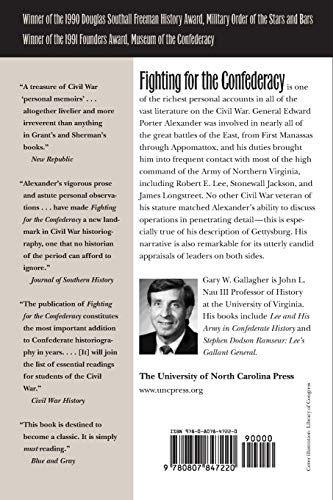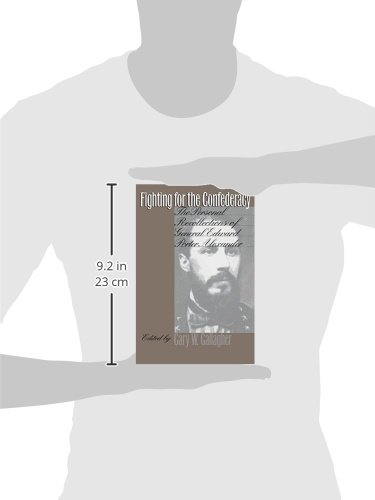



Fighting for the Confederacy: The Personal Recollections of General Edward Porter Alexander (Civil War America)
F**O
A detailed day-by-day account of one soldier's experience
In Fighting for the Confederacy, Edward Porter Alexander and Gary W. Gallagher put us on the ground, in one officer's boots, and give us a day-by-day and remarkably detailed account of that officer's experience in the Civil War. A large portion of the book consists of (here comes that word again) detailed accounts of individual battles. If such accounts do not interest you, skim over them or don't buy the book. The other details, where Alexander stayed, what his meals were like, what his nighttime marches were like remind me why I like history. The circumstances are foreign but people are people just the same. There's drama, irony, pleasure, pain, and humor. And all in the context of our greatest national tragedy.Alexander was an intelligent, educated, and well-spoken man. His work is remarkably easy to read. Gallagher is responsible in part, by adding apostrophes, standardizing spelling, &c&c, but much of the credit goes to Alexander. His one fault as an author is that he sometimes writes about what his going to write about and then writes about what he told you he was going to write about. Otherwise his prose is enjoyable, especially his humor. This humor sometimes comes out in euphemistic descriptions of what must have been gory events. Sharpshooting and artillery attacks are described as "artillery practice". (I follow the CSE manual when it comes to quotation marks.) One sentence reads "we began to hear . . . those grand roars of musketry & quick thunders of artillery which announce that the great god or demon of war is about to hold one of his great carnivals." General Grant is said to make "interesting 4 am calls." Alexander's humor suits the circumstances because of his interesting take on combat. He enjoyed it.Alexander enjoyed combat not just from behind his artillery, but also when he had the chance to pick up a rifle, and he took every chance he could. Oh, here's an opportunity for some sharpshooting! Here's a chance to join the infantry, chase the Yankees, and maybe shoot a few! And yet if there was a cease-fire, Alexander would mingle with the Yankees and hope to chat with old friends. Alexander enjoyed the war in general, not just the combat. He enjoyed working with his men. He enjoyed some of the night marches. He enjoyed placing artillery, eventually for General Lee directly. Alexander knew Lee, Longstreet, Jackson, &c&c, all the celebs.One reviewer says that Alexander falls back close to the Lost Cause explanation of the Civil War and goes on to state that the war was about protecting slavery. Alexander does say he fought for the right to secede, and he says that the South in general felt the same way, but the war was not fought to protect slavery. Lincoln always insisted that the Federal government had no authority to regulate slavery in the states. More importantly, the Dred Scott decision made slavery more secure than ever in the history of the United States or colonies. Not only did Dred Scott ensure that slavery could spread throughout all of the territories, it implied that the states had no authority to exclude slavery. The next Supreme Court decision could have spread slavery to Massachusetts. I think the first round of secessions were emotional reactions to decades of criticism over slavery. Lincoln's election was the last straw. The next round occurred because Lincoln ordered the states to call up their militias and that forced states to choose sides. But maybe Andrew Jackson was right. South Carolina's goal was independence. The first excuse was the tariff. The next was Lincoln's election. Regardless, that reviewer knows enough history to know "Lost Cause" but maybe not much more. If McClellan had shown some initiative, he might have won the Peninsula Campaign, taken Richmond, and ended the war with slavery INTACT.Back to the book. There is a parallel with Mary Chestnut's Civil War. Both are long, detailed, and provide more and more of the same thing. In Fighting for the Confederacy, there is battle after battle. In MC's Civil War, it is social event after social event. In both, the length and repetition make the end more poignant. Both should be on every eighth grader's readers' list. No, that's my joke about Keith Richards' autobiography, Life.
D**.
Fantastic Book - What a Find!
I recently stumbled across two books of memoirs by Gen. Edward Porter Alexander.Fighting for the Confederacy: The Personal Recollections of General Edward Porter AlexanderMilitary Memoirs of A ConfederateIf you haven’t read his "personal" memoir, “Fighting for the Confederacy,” I highly recommend it! I’m finding it fascinating. These memoirs were never published, and were “lost” until discovered and then published in1989. Alexander wrote much of it while away on business in South America, and lonely enough that he had time to sit and write - and write with relish he did. He wrote for his children, who had been nagging him to capture his memories in writing, and he never intended for his personal memoirs to be published. He didn’t have lots of reference material with him, so he drew upon his memory and strongest personal recollections, and felt free to express lots of personal opinions, which make the book a pleasure to read and illuminate the history wonderfully.The act of writing his personal story drew him in. He had been carrying his “assessment” of the different battles in his mind for years (this was 1894), and wanted to focus on the military “chess game” that was being played by the generals on both sides. So after he finished his personal memoirs for his family, he started again and rewrote his memoirs in a more formal, “detached” and analytic manner, this time with the intention of publishing them. This is how the second book (Military Memoirs of a Confederate) came about, and also why the first set of memoirs were never published. They sat in a pile of their family's papers, most subsequent archivists assuming that they were early drafts of the second book, until it was finally realized that they were an entirely separate and earlier personal work.I haven’t read the second book yet - but skimmed it a bit. I decided to read the personal history first — as I thought it would be more interesting, and perhaps I’d then have a lot more context to help me through the second book’s “analysis” of the battles.I’m surprised at how much I “relate” to this man — not only as a person but in the events that he participated in. I find that because I’ve read enough Civil War material over the years, and also have visited places like Harper’s Ferry, Bull Run, Antietam, Richmond, Fredericksburg, (etc etc.), that I’m surprisingly familiar with a lot that he’s writing about. His writing “rings a bell” so to speak - and that is a pretty cool feeling to have considering he is writing about things from 150 years ago.Two quick anecdotes. First, while he expresses zero regret for fighting as hard as he did against the Federal army, he is really very glad that the Confederacy was defeated in the end. His description of why that is almost feels like he's sitting in our seats and looking back at the last 150 years, and his description feels prophetic. Second, he describes how Stonewall Jackson might have ended the war early in 1862, with a crushing victory for the South, but for his religious “trust in the will of the Lord, and follow his commandments” mindset that caused him to avoid fighting on the Sabbath (Sunday). Apparently Jackson eventually got over his hangup about that - but the tremendous opportunity was lost forever. Thank God! ;-)This and many more great anecdotes - including a number about Gen. Robert E. Lee that reveal somewhat more of him - and thus make him more accessible as a real person than some ancient mythically heroic figure - than I'd read about before.Can't recommend this enough.
D**N
Fighting For the Confederacy. Personal Recollections of General Edward Porter Alexander
I have read many Civil War memoirs: Sherman, Grant, Longstreet, Hood, Joseph Johnson, Sam Wadkins, Elijah Hunt Rhodes, Chamberlain, and many others I've forgotten, and many diaries, Gideon Welles, Mary Chesnut, Templeton Strong etc giving a flavour of the period and this is simply the most insightful and entertaining original source material I've read by a huge margin. And yet it was not written for publication!Infact with the exception, possibly of Shelby Foote's trilogy this is the best commentary on the Civil War I've ever read.Why? Read it and find out. If you are an addict of the Civil War and haven't read this, you must.Simply a treasure.
R**L
Recreates the history
Probably the most impressive and most interesting personal memoir of the American Civil War, although from the Confederate side. Recreates the history and takes you back into the atmosphere and reality of the war.
L**Y
Great book
Great service and great book!
B**E
Five Stars
One of the best books by someone who was " there"
Trustpilot
2 months ago
2 weeks ago